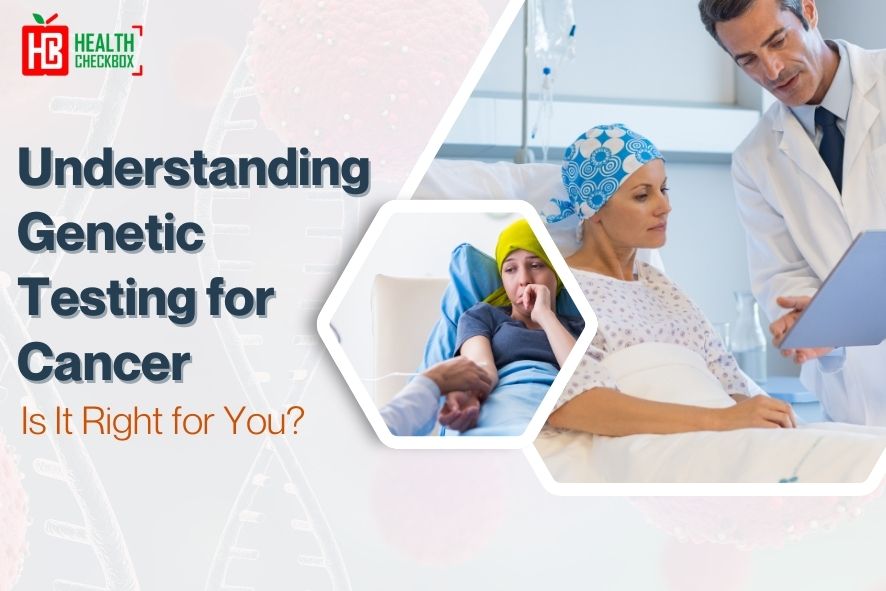Need for genetic testing for cancer in patients showing the symptoms of cancer. Genetic testing tests to identify the inherited mutation in a person’s DNA that might increase the risk of cancer in the future. The test identifies the changes in genes like BRCA1, BRCA2, and Lynch syndrome genes. And also for other types of cancer that are linked with hereditary cancer. The majority of cancers occur due to genetic changes during a lifetime; only 6-10% of all cancers are genetically inherited.
The test is performed by obtaining your saliva or blood sample, and it might take several weeks to process and get the final result. However, genomic testing is different from genetic testing, as genomic testing examines the DNA of blood cells of a patient who already has cancer. It is obtained to prepare the best treatment for the particular patient.
Who Should Consider Genetic Testing For Cancer?
Many factors can help determine who should undergo genetic testing:
- People who have a family history of cancer must undergo this testing. Especially for the families in which multiple members are suffering from the same type of cancer.
- Individuals who are treated or diagnosed with cancer at a very young age must test themselves. Like, cancers like colon cancer or breast cancer before the age of 50.
- People with a combination of cancer should consider testing. Patients suffering from two or more types of cancer, like breast cancer and ovarian cancer, are the most common example of multiple cancers.
- The population inherits cancer, and populations of some specific areas face a higher mutation rate for several cancers. They must test themselves in nearby healthcare.
- If there is a member of the family who has inherited cancer genetically. Other members of the family and relatives must undergo this treatment, especially for that particular type of cancer.
Benefits of Genetic Testing
- A good knowledge of your own health is good for making better decisions. If your result is positive for a high-risk mutation, your healthcare team can plan appropriately for you. And you also must be tested regularly.
- Measures taken to reduce risk can definitely lower the risk of cancer. Options of preventive surgeries, like oophorectomy or prophylactic mastectomy, reduce the chance by up to 95% in early detection of cancer.
- Testing yourself can help the family members too to check themselves if you have tested positive. They can test themselves to identify the risk and make a better decision about their health at an early stage.
- If results are negative, there should be less necessity for screening and medical testing further for the same. You can take regular screening if you have tested negative for the mutation that is already present in someone in your family. Because the mutations can occur at any stage of life.
- Genetic testing for cancer patients can help doctors determine to more specific and more effective plan and treatment option.
Limitations and Considerations of Genetic Testing
Like every other test, there are some considerations and limitations for this testing too, as below:
- Detection is limited to only a few mutations; scientists are still working to discover new genes related to cancer. It simply means that testing doesn’t guarantee you for cancer.
- If the result is positive, it doesn’t always mean that a person will develop cancer for sure. So many people with mutations don’t develop cancer in their whole lives.
- Multiple options could be created by variants of uncertain significance. Some test shows the change in genetics, still their impact on cancer or risk of cancer is unknown. It can leave you without the proper guidance, what to do or what not to do.
- Genetic testing for cancer can impact a person psychologically as well as emotionally. Knowing that you are positive can cause you anxiety, fear, and stress. Some people also experience survivor’s guilt when all family members test positive except the person.
Insight for Genetic Testing for Cancer
- First, you will be counselled before the test, and a counselor from healthcare will examine your family health history. They will guide you about different tests and suggest the best appropriate test according to the conditions. They will also help you to understand the basic benefits and limitations of genetic testing.
- Insurance covers a lot of medical conditions related to cancer, but there are some criteria for genetic testing. Many premium plans cover this only if the requirement is met. Requirements can be based on personal medical history or family medical history. Some hospitals also offers a pre-made program to stay under your budget.
- The outcome or result must be among positive, negative, or VUS. In detail, a positive means a mutation is found, a negative means no mutation is found, and VUS means the change is detected, but the exact mutation is still not specified.
- Counseling about your genetics after the test helps to make a better decision. Take advice from your healthcare team about the results, and discuss treatment options if required.
Conclusion
For people who are at risk of cancer, genetic testing for cancer is very important. This test helps an individual to take a proper step towards their treatment. If you have a family history of cancer, then it is advised to have this test. Because some cancerous cells develop genetically. Always consult your doctor about whether genetic testing is appropriate for you or not. This is the only test by which, if a cancer is detected early, outcomes could be different in the future.

